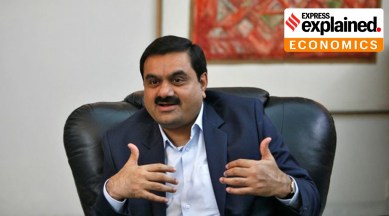Adani responds, Hindenburg rebuts: What’s in their back-and-forth exchange?
Hindenburg has said that it is continuing its due diligence of the Adani Group and will continue to update its list of issues in the coming days. Here is what the two have accused each other of so far.

On January 29, Adani Group responded to the explosive Hindenburg report that accused the conglomerate of “brazen stock manipulation and accounting fraud scheme over the course of decades”.
Adani’s response has questioned Hindenburg’s credentials and the timing of the report, arguing that the report is not just an “unwarranted attack on any specific company but a calculated attack on India, the independence, integrity and quality of Indian institutions, and the growth story and ambition of India”.
monthly limit of free stories.
with an Express account.
Following the publication of Hindenburg Research’s January 24 report, the Adani Group lost more than USD 50 billion in market value in just two trading sessions, with Chairman Gautam Adani losing over USD 20 billion, or about one-fifth of his total fortune.
The original accusations: ‘largest con in history’
On January 24 (January 25 in India), New York-based Hindenburg Research released a report titled, “Adani Group – How The World’s 3rd Richest Man Is Pulling The Largest Con In Corporate History”. The report claimed its “2-year investigation” presented “evidence that the INR 17.8 trillion (U.S. $218 billion) Indian conglomerate Adani Group has engaged in a brazen stock manipulation and accounting fraud scheme over the course of decades”.
The report claimed to show evidence of various irregularities in Adani’s finances, from inflated stock valuations to sky-high debt. It said the conglomerate was being run unprofessionally like “a family business”, with Adani family members “controlling the group’s finances and key decisions”.
The report also accused the conglomerate of operating multiple shell companies, often offshore, “to serve several functions, including stock parking/ manipulation, and laundering money through Adani’s private companies onto the listed companies’ balance sheets in order to maintain the appearance of financial health and solvency”.
Adani’s response: ‘Attack on India’s growth story’
Almost immediately, as Adani Group stocks went into freefall, Jugeshinder Singh, Chief Financial Officer of the Group, called the report a “malicious combination of selective misinformation and stale, baseless and discredited allegations”.
On January 29, Adani released a 413-page response in which it equated the Hindenburg report to a “calculated attack on India”, its institutions and the India “growth story”. The response revolved around the following themes.
Questioning Hindenburg’s intent
Calling Hindenburg’s report “nothing but a lie”, Adani’s response questioned Hindenburg’s motives. It said that the report was released with the “admitted intent of Hindenburg to profiteer at the cost of our shareholders and public investors”.
It accused Hindenburg of being an “unethical short seller” that has sought to “effect a downward spiral of (Adani’s) share price and make a wrongful gain”.
It also accused Hindenburg of concealing crucial pieces of information, from “details of its short positions” to “sources of its funding”.
Allegations already debunked
A central feature of Adani’s response is that the Hindenburg report relies on “allegations which have since been judicially determined to be false”. It says that “the allegations and innuendoes made in the Hindenburg report are knowingly false”.
In its response to the “88 questions raised by Hindenburg”, Adani states that much of the allegations made have already been “disclosed” by the group and in a some cases, Adani has even received favourable verdicts from institutions like the Appellate Tribunal (CESTAT) and the Supreme Court.
It says that “Hindenburg has sought to spotlight selective media reporting while deliberately ignoring judicial findings”.
Standard operating practices in India
The Adani Group has claimed that Hindenburg’s questions regarding the company’s convoluted organisational structures fails “to comprehend that in the infrastructure business, especially in a sprawling geography like India, most large corporates operate in a similar fashion”.
Hindenburg’s rebuttal: ‘can’t equate Adani’s success with India’s’
The rebuttal says that the Adani response does not address any of the substantive points that the report raised. Rather, Adani has “stoked a nationalist narrative” that seeks to conflate the “meteoric rise and the wealth of its Chairman, Gautam Adani, with the success of India itself”, the rebuttal says.
“In terms of substance, Adani’s ‘413 page’ response only included about 30 pages focused on issues related to our report. The remainder of the response consisted of 330 pages of court records, along with 53 pages of high-level financials, general information, and details on irrelevant corporate initiatives, such as how it encourages female entrepreneurship and the production of safe vegetables,” Hindenburg has said.
Among the issues that were addressed, “Adani’s response largely confirmed our findings and ignored our key questions,” it said.
What happens next?
This issue is not likely to die down soon. Hindenburg has said that it is continuing its due diligence on the Adani Group and will continue to update its list of issues in the coming days. Adani, on the other hand, has threatened legal action to protect its interest and the interests of its investors.